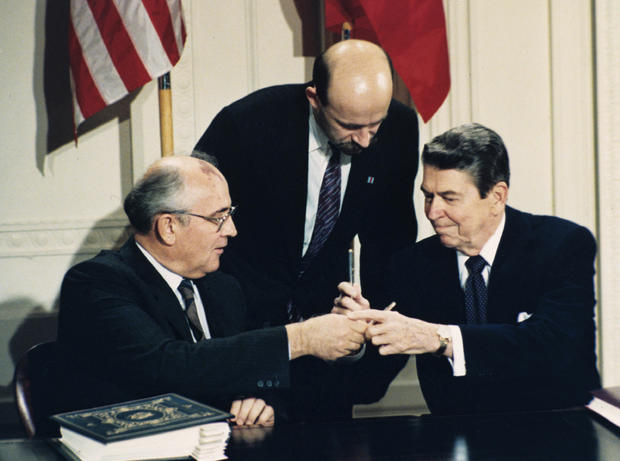U.S. withdraws from Reagan-era nuclear arms agreement with Russia
The U.S. has formally withdrawn from the Intermediate-Range Nuclear Forces (INF) Treaty, a missile reduction agreement signed by Presidents Ronald Reagan and Mikhail Gorbachev in 1987. Secretary of State Mike Pompeo made the announcement Friday after announcing in February that U.S. participation in the pact was being suspended.
The U.S. has been unhappy with what it asserts has been Russia's lack of compliance with the treaty for years, dating back to the Obama administration -- charges Moscow denies.
Senior Trump administration officials put the blame for the U.S. pulling out of the pact squarely on Russia.
In a statement, Pompeo said, "Russia is solely responsible for the treaty's demise. ... The United States will not remain party to a treaty that is deliberately violated by Russia." On Friday morning, Pompeo tweeted: "Treaties are worthless unless respected by all signatories."
Pompeo, who is in Thailand for an Asian security conference, added, "The United States remains committed to effective arms control that advances U.S., allied, and partner security; is verifiable and enforceable; and includes partners that comply responsibly with their obligations."
He took to Twitter, as well:
Although the U.S. has long considered Moscow a "serial violator" of the accord, the Trump administration officials pointed to a new finding that the Kremlin has been producing and fielding multiple battalions of the Novator 9M729 ground-launched cruise missile, placing some in western Russia, in striking distance of European targets. Its estimated range is 1,600 miles.
The officials say they believe "all of western Europe is within range of this missile system." The officials say that poses a critical threat to the security of the U.S. and its allies, making the U.S. withdrawal from the treaty "unavoidable."
The treaty has been a key component of European security.
According to the Reuters news service, Russian Deputy Foreign Minister Sergei Ryabkov said Friday, "We have proposed to the United States and other NATO countries that they weigh the possibility of declaring the same kind of moratorium on the deployment of short and intermediate range missiles as ours, like the one announced by Vladimir Putin." Reuters cited Russia's TASS news agency.
But The Associated Press said a senior administration official spoke on condition of anonymity told it that, with the U.S. now free to develop weapons systems that were previously banned, the Pentagon is planning a test flight of such a weapon in coming weeks.
The INF Treaty required the destruction of of a particular class of weapons, banning medium-range, ground-based missiles capable of carrying nuclear arms — with a range of 310 to 3,400 miles. After it was signed, the U.S. and Russia dismantled more than 2,600 missiles.
The Council on Foreign Relations says missiles in this class are particularly dangerous because they're capable of reaching their targets in 10 minutes, allowing for very little response time and creating the potential for deadly mistakes.
Reporting by Sara Cook. Kathryn Watson contributed to this report.




